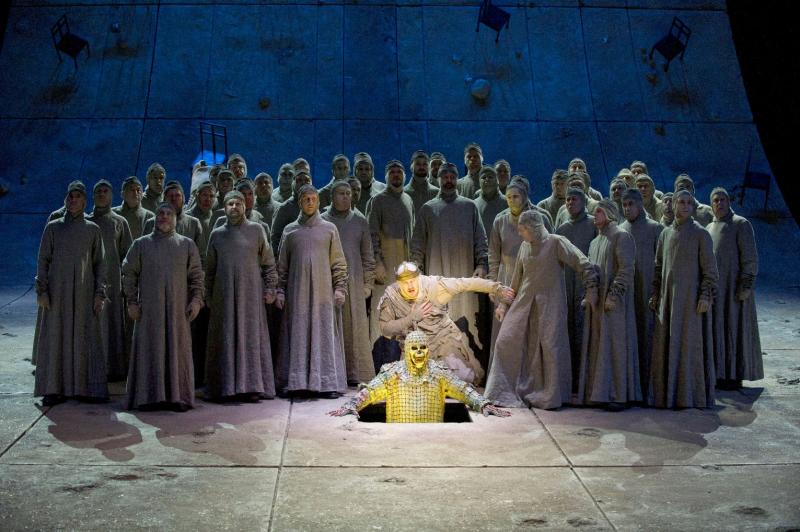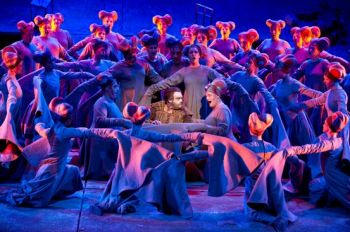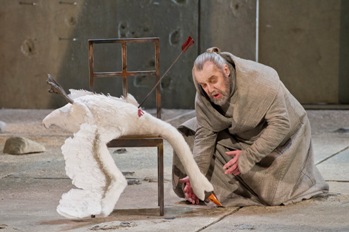Parsifal, English National Opera | reviews, news & interviews
Parsifal, English National Opera
Parsifal, English National Opera
Diehard anti-Wagnerian gives in to miraculous Lehnhoff revival

Some of you will know that Wagner and I haven't been seeing eye to eye of late. Last year's Tannhäuser I believed was the end of the road for the two of us. Not quite. With one of the most celebrated Wagner productions of the past two decades returning to the English National Opera last night - Nikolaus Lehnhoff's Parsifal - I decided to give him a final chance. My whole mind, body and soul was primed to repel it, yet I came out almost blubbing.
The revelation didn't come immediately - nothing in Wagner comes immediately - though it didn't take long for the music to start having its effect. I'd forgotten how gentle the score to Wagner's final opera is. How conventionally ingratiating it is. How it laps against you, lightly soothing, lightly stinging. How little it tries to suffocate or overwhelm like Tristan. When the music burns - and the English National Opera orchestra glowed gloriously last night in the hands of conductor Mark Wigglesworth - it is as a cinder: static, dark, concentrated. It's an altogether unique musical experience, quite unlike your conventional breathless Wagner - though the second act conforms more to type.
The quality of the singing, too, made itself felt early. John Tomlinson's Gurnemanz had us eating out of his hand, that familiar booming voice giving the most natural and convincing shape and fluency to his key early storytelling. Iain Paterson was a harrowing Amfortas, his song of woe sending him spinning across stage like a sot. Both Stuart Skelton's Parsifal (pictured below) and Jane Dutton's Kundry gained in power the more they were given to do. Tom Fox's Klingsor was perhaps the least memorable of the ensemble, partly because the Act Two setting - veiled by a giant pelvic screen - was so very memorable. Act Three was incredible, Tomlinson (pictured bottom), Skelton and Paterson singing and acting out of their skins as relationships reach their emotionally fraught conclusions.
 Yet all of this would have been for naught if the toxic moral dichotomy thrown up by the libretto had not been tackled and undermined. For make no mistake, at its heart, this is a tale about goodies and baddies. And the goodies are the baddies and the baddies the goodies. No amount of special pleading can hide that fact. The He-Man costumes certainly didn't. In the good corner, you have an army of enfeebled Aryan Christians seeking an idiot savant to replenish their powers; in the bad, a bullied outcast, Klingsor, and a heathen (ie, Jewish) slut, Kundry, who is converted to Christianity but who, ultimately, (because she is heathen-Jew) must die. A potent (and influential) brew of misogyny, racism and Aryan triumphalism.
Yet all of this would have been for naught if the toxic moral dichotomy thrown up by the libretto had not been tackled and undermined. For make no mistake, at its heart, this is a tale about goodies and baddies. And the goodies are the baddies and the baddies the goodies. No amount of special pleading can hide that fact. The He-Man costumes certainly didn't. In the good corner, you have an army of enfeebled Aryan Christians seeking an idiot savant to replenish their powers; in the bad, a bullied outcast, Klingsor, and a heathen (ie, Jewish) slut, Kundry, who is converted to Christianity but who, ultimately, (because she is heathen-Jew) must die. A potent (and influential) brew of misogyny, racism and Aryan triumphalism.
So Lehnhoff's complication of Wagner's directions is a relief and in the end a miracle of interpretation. Where do the war-weary army start their journey? In a gunshot-marked concrete chamber, demolished chimney holes eyeing us up from the top. Why are these German heroes in a concentration camp? Are they trapped by their present? Or their past? And what of the source of evil, Kundry? Lehnhoff tries to free her from the hysterical female straitjacket in which Wagner clearly wants to keep her and, in Act Three, even suggests her as a saviour - in explicit contradiction to Wagner's instruction for her to die.
It's not all hunky-dory. Parsifal is still an opera where it's better to forget causes if you wish to find conclusions moving. Even in this production, the first two acts are problematic. How can we applaud Parsifal's arrogance? How can we ignore the misogyny? How can we look upon this militaristic, racist Christian brotherhood as anything but a thoroughly nasty Waco-like cult? Lehnhoff somehow makes it possible.
Kundry is key. She begins Act Two with her body submerged to her head like Beckett's Winnie. The more she questions and explores her conscience and that of those around her - the only character to do so - the more human she becomes. From her solitary head, she gains a pupa, a chrysalis and then a full human body. Her self-realisation and self-sacrifice (she is both baptised and Aryanised, her hair turning from black to blond by Act Three) trumps Parsifal's heroics.
 Parsifal's journey can only return the Knights to their parochial cultish preoccupations. What Kundry can offer them is true freedom: from religious strictures, from their past, from their leaders - now that their former kings Titurel (a spookily scaly green knight, Andrew Greenan) and Amfortas lie dead. The fundaments of this religious army are dashed against the rock of the true message of Good Friday that Gurnemanz proclaims to Parsifal so movingly and their realisation that Kundry's behaviour fits the self-abnegating messianic bill far better than Parsifal's.
Parsifal's journey can only return the Knights to their parochial cultish preoccupations. What Kundry can offer them is true freedom: from religious strictures, from their past, from their leaders - now that their former kings Titurel (a spookily scaly green knight, Andrew Greenan) and Amfortas lie dead. The fundaments of this religious army are dashed against the rock of the true message of Good Friday that Gurnemanz proclaims to Parsifal so movingly and their realisation that Kundry's behaviour fits the self-abnegating messianic bill far better than Parsifal's.
So Kundry follows the railway tracks out of their concrete home, individual soldiers and Parsifal staggering behind. Are these half-dead Jews hobbling out of Auschwitz? Are these Germans finally breaking free of their past? Certainly, they are survivors, newborns, individuals, free of their fraternal responsibilities and prejudices. Would Wagner have approved? Absolutely not. Can the music take it? Without doubt. Should we encourage this sort of fiddling? Anything that can force a Wagner divorcee like me to eat this much humble pie - to admit that Parsifal is probably after all the greatest opera ever written - is doing something pretty incredible and very right. Hell, I might even go again.
Share this article
Add comment
The future of Arts Journalism
You can stop theartsdesk.com closing!
We urgently need financing to survive. Our fundraising drive has thus far raised £49,000 but we need to reach £100,000 or we will be forced to close. Please contribute here: https://gofund.me/c3f6033d
And if you can forward this information to anyone who might assist, we’d be grateful.

Subscribe to theartsdesk.com
Thank you for continuing to read our work on theartsdesk.com. For unlimited access to every article in its entirety, including our archive of more than 15,000 pieces, we're asking for £5 per month or £40 per year. We feel it's a very good deal, and hope you do too.
To take a subscription now simply click here.
And if you're looking for that extra gift for a friend or family member, why not treat them to a theartsdesk.com gift subscription?
more Opera
 Albert Herring, English National Opera review - a great comedy with depths fully realised
Britten’s delight was never made for the Coliseum, but it works on its first outing there
Albert Herring, English National Opera review - a great comedy with depths fully realised
Britten’s delight was never made for the Coliseum, but it works on its first outing there
 Carmen, English National Opera review - not quite dangerous
Hopes for Niamh O’Sullivan only partly fulfilled, though much good singing throughout
Carmen, English National Opera review - not quite dangerous
Hopes for Niamh O’Sullivan only partly fulfilled, though much good singing throughout
 Giustino, Linbury Theatre review - a stylish account of a slight opera
Gods, mortals and monsters do battle in Handel's charming drama
Giustino, Linbury Theatre review - a stylish account of a slight opera
Gods, mortals and monsters do battle in Handel's charming drama
 Susanna, Opera North review - hybrid staging of a Handel oratorio
Dance and signing complement outstanding singing in a story of virtue rewarded
Susanna, Opera North review - hybrid staging of a Handel oratorio
Dance and signing complement outstanding singing in a story of virtue rewarded
 Ariodante, Opéra Garnier, Paris review - a blast of Baroque beauty
A near-perfect night at the opera
Ariodante, Opéra Garnier, Paris review - a blast of Baroque beauty
A near-perfect night at the opera
 Cinderella/La Cenerentola, English National Opera review - the truth behind the tinsel
Appealing performances cut through hyperactive stagecraft
Cinderella/La Cenerentola, English National Opera review - the truth behind the tinsel
Appealing performances cut through hyperactive stagecraft
 Tosca, Royal Opera review - Ailyn Pérez steps in as the most vivid of divas
Jakub Hrůša’s multicoloured Puccini last night found a soprano to match
Tosca, Royal Opera review - Ailyn Pérez steps in as the most vivid of divas
Jakub Hrůša’s multicoloured Puccini last night found a soprano to match
 Tosca, Welsh National Opera review - a great company reduced to brilliance
The old warhorse made special by the basics
Tosca, Welsh National Opera review - a great company reduced to brilliance
The old warhorse made special by the basics
 BBC Proms: The Marriage of Figaro, Glyndebourne Festival review - merriment and menace
Strong Proms transfer for a robust and affecting show
BBC Proms: The Marriage of Figaro, Glyndebourne Festival review - merriment and menace
Strong Proms transfer for a robust and affecting show
 BBC Proms: Suor Angelica, LSO, Pappano review - earthly passion, heavenly grief
A Sister to remember blesses Puccini's convent tragedy
BBC Proms: Suor Angelica, LSO, Pappano review - earthly passion, heavenly grief
A Sister to remember blesses Puccini's convent tragedy
 Orpheus and Eurydice, Opera Queensland/SCO, Edinburgh International Festival 2025 review - dazzling, but distracting
Eye-popping acrobatics don’t always assist in Gluck’s quest for operatic truth
Orpheus and Eurydice, Opera Queensland/SCO, Edinburgh International Festival 2025 review - dazzling, but distracting
Eye-popping acrobatics don’t always assist in Gluck’s quest for operatic truth
 MARS, Irish National Opera review - silly space oddity with fun stretches
Cast, orchestra and production give Jennifer Walshe’s bold collage their all
MARS, Irish National Opera review - silly space oddity with fun stretches
Cast, orchestra and production give Jennifer Walshe’s bold collage their all

Comments
...